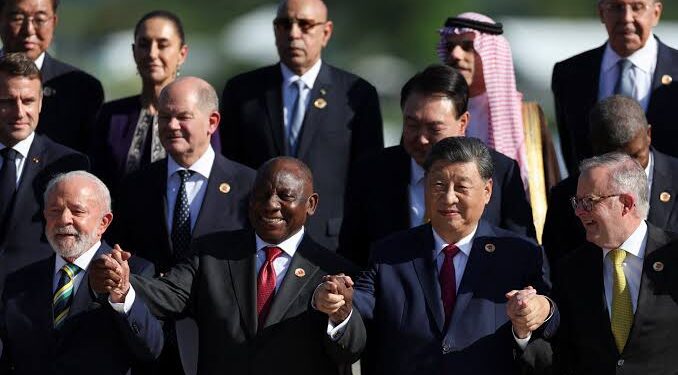South Africa took on the presidency of the G20 on December 1, 2024. This marks a crucial opportunity for Africa to influence global economic policies. The country aims to spotlight Africa’s economic challenges while balancing global geopolitical tensions. However, skepticism remains about how much the G20 can achieve in addressing these issues.
Africa’s Economic Challenges in Focus
South Africa plans to use its leadership to address Africa’s development hurdles. Debt financing, infrastructure investment, and climate resilience are its top priorities. Many African countries struggle with heavy debt burdens, slowing economic growth. The pandemic, Russia’s war in Ukraine, and global inflation have worsened the situation. Several African nations face bankruptcy or default due to these pressures.
In 2019, African countries allocated an average of 3.7% of their GDP to infrastructure. This is lower than South America’s 4.4% and South Asia’s 9.1%. The African Development Bank estimates that closing Africa’s infrastructure gap requires $130 billion to $180 billion annually. Despite substantial funding, the shortfall remains between $68 billion and $108 billion each year.
The Township Economy and Sustainable Development
South Africa is focusing on the township economy, which emerged during apartheid due to economic exclusion. The government launched Township20, a program to integrate informal economies into mainstream markets. This initiative aims to attract investment and create economic opportunities in historically marginalized areas.
Climate change is another critical issue on the G20 agenda. South Africa wants to address extreme droughts affecting the Southern African Development Community. Countries like Botswana, Lesotho, Malawi, Namibia, Zambia, and Zimbabwe have declared national disasters. The G20 presidency presents a chance to push for sustainable solutions in agriculture and energy.
Global Conflicts and Political Pressures
South Africa’s presidency comes at a time of rising global tensions. The conflicts in the Middle East and Ukraine are disrupting trade and food supplies. As a BRICS member, South Africa maintains close ties with Russia and China. However, its alignment with BRICS nations like Iran and Russia has strained relations with Western countries.
The U.S. and the European Union have expressed concerns about South Africa’s diplomatic stance. Washington is considering trade tariffs on BRICS nations, which could impact South Africa’s economy. If Donald Trump returns to the White House, tensions could rise further. His administration has proposed a 100% tariff on BRICS countries that challenge the U.S. dollar’s dominance.
Balancing Global and African Priorities
South Africa’s challenge is to balance Africa’s needs with global geopolitical realities. The G20 presidency provides a platform to advocate for Africa’s economic growth. However, geopolitical rivalries between global powers could distract from development goals.
To succeed, South Africa must navigate diplomatic pressures while pushing its agenda. The country needs to ensure that Africa’s priorities remain central despite global conflicts. Its leadership in the G20 could define Africa’s role in the evolving world economy.
Related Stories:
China and South Africa Strengthen BRICS Cooperation, Pledge for Deeper Ties
Key Highlights of G20 Summit 2024, Rio de Janeiro, Brazil
China’s Xi announces steps to support ‘Global South’ at G20 summit
















